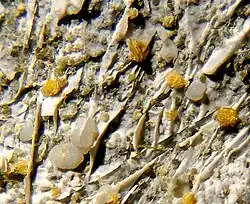Cafetite
| Cafetite | |
|---|---|
 | |
| General | |
| Category | oxide mineral |
| Formula | (Ca,Mg)(Fe,Al) 2Ti 4O 12·4(H 2O) |
| IMA symbol | Cft[1] |
| Strunz classification | 4.FL.75 |
| Crystal system | Monoclinic |
| Crystal class | Prismatic (2/m) (same H-M symbol) |
| Space group | P21/n |
| Unit cell | a = 4.944 Å, b = 12.109 Å, c = 15.911 Å; β= 98.93°; Z = 8[2] |
| Identification | |
| Color | Pale yellow to colorless |
| Crystal habit | Elongated columnar to acicular crystals, fibrous aggregates, pseudo-orthorhombic |
| Cleavage | Prismatic |
| Tenacity | Brittle |
| Mohs scale hardness | 4–5 |
| Luster | Adamantine |
| Streak | White |
| Diaphaneity | Semitransparent |
| Specific gravity | 3.28 |
| Optical properties | Biaxial (–), 2V=58°, Dispersion very strong, r > v |
| Refractive index | nα = 1.95, nβ = 2.08, nγ = 2.11 |
| Birefringence | δ = 0.16 |
| Pleochroism | none |
| 2V angle | Measured: 38° |
| References | [2][3][4][5] |
Cafetite is a rare titanium oxide mineral with formula (Ca,Mg)(Fe,Al)
2Ti
4O
12·4(H
2O). It is named for its composition, Ca-Fe-Ti.[5]
It was first described in 1959 for an occurrence in the Afrikanda Massif, Afrikanda, Kola Peninsula, Murmanskaja Oblast, Northern Region, Russia.[4][3] It is also reported from the Khibiny and Kovdor massifs of the Kola Peninsula and from Meagher County, Montana, US.[4]
It occurs in pegmatites in a pyroxenite intrusion as crystals in miarolitic cavities. It occurs associated with ilmenite, titaniferous magnetite, titanite, anatase, perovskite, baddeleyite, phlogopite, clinochlore and kassite.[3]
References
- ^ Warr, L.N. (2021). "IMA–CNMNC approved mineral symbols". Mineralogical Magazine. 85 (3): 291–320. Bibcode:2021MinM...85..291W. doi:10.1180/mgm.2021.43. S2CID 235729616.
- ^ a b Mineralienatlas
- ^ a b c Handbook of Mineralogy
- ^ a b c Mindat.org
- ^ a b Webmineral.com
Wikimedia Commons has media related to Cafetite.